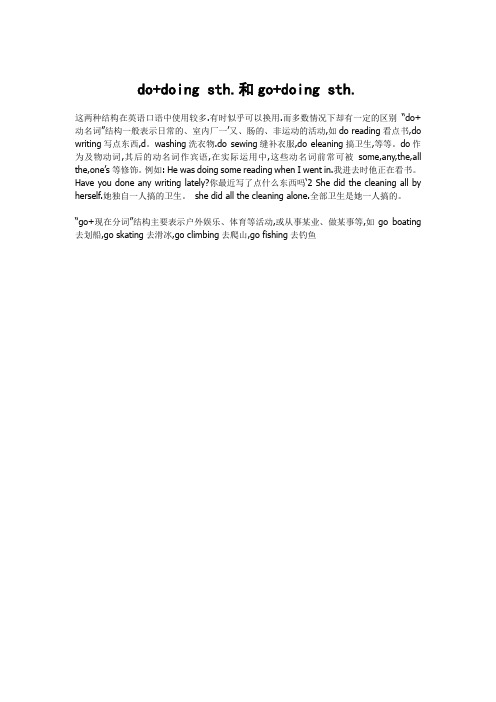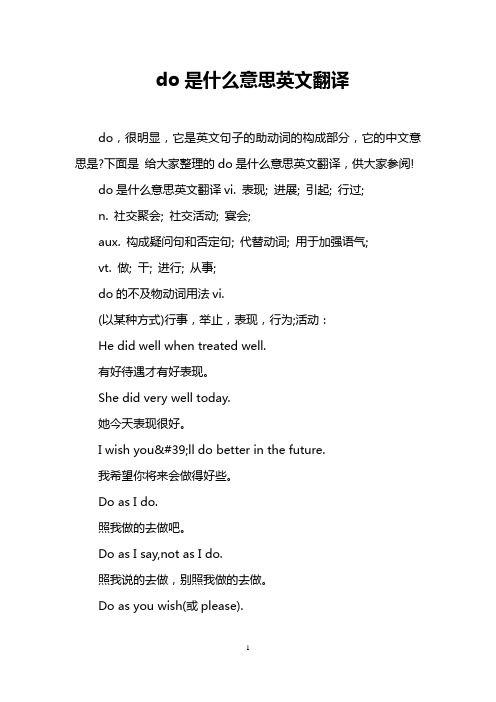do及物动词
- 格式:doc
- 大小:31.50 KB
- 文档页数:4


do/to do/doing的用法区别_用法辨析想当年,在我五年级的时候,英语课堂上一会儿doing,一会儿(to)do的,真是让我天昏地暗那。
不过呢,我从小便聪明刻苦,深知功夫要勤练才会有长进的,所以我就直接闭关修炼了一个学期,将其秘诀刻入心中:一、常见的用动名词作宾语的及物动词或词组:【单词类】:avoid (避免) , appreciate(欣赏), admit(承认), advise(建议), cease (停止) , consider (考虑) , deny (抵赖) , delay (拖延) , enjoy (喜欢) , endure (忍受) , escape (逃离) , excuse (原谅) , finish (完成) , imagine (想象) , include(包括) , keep(on) (继续) , leave off (结束、省去) , mind (介意、反对) , miss (错过) , need (需要) , postpone (推迟) , permit(允许), practise (练习) , put off (推迟) , require (需要) , risk (冒险) , resist(抵抗) stop (停止) , suggest (建议) 等。
【词组类】:be worth doing(值得做某事),be tired of, succeed in, look forward to, pay attention to, get down to, insist on, devote oneself to, put off, cant help, give up, keep/protect/prevent/stop sb from, have difficulty in, spend time (in), its no use/good, be afraid of, be busy 等。

高考英语接to do还是doing 作宾语之及物动词全总结一、接To-v做宾语的及物动词aimto do sth 打算dare to do sth 敢于appear to do sth 似乎arrange to do sth 安排demand to do sth 要求help to do sth 帮助hesitate to do sth 犹豫plan to do sth 计划want to do sth 想要fail to do sth 未能seek to do sth 试图prepare to do sth 准备happen to do sth 碰巧proveto do sth证明expect to do sth 期待wish to do sth 希望hope to do sth 希望decide to do sth 决定refuse to do sth 拒绝offer to do sth 主动提出learn to do sth 学会agreeto do sth 同意choose to do sth 选择promise to do sth 承诺pretend to do sth 假装manage to do sth 设法care to do sth 想要determineto do sth 决定afford to do sth 负担得起waitto do sth 等待fear to do sth 害怕long to do sth 渴望struggle to do sth 努力beg to do sth 请求二、接V-ing做宾语的及物动词admitdoing sth承认report doing sth 报告appreciatedoing sth 感激denydoing sth 否定explaindoing sth 解释mention doing sth 提及resist doing sth 拒绝stand doing sth 忍受imagine doing sth 想象recall doing sth 想起suggestdoing sth 建议mind doing sth 介意finishdoing sth 完成enjoy doing sth 喜欢keepdoing sth 继续practice doing sth 练习miss doing sth 错过avoid doing sth 避免delay doing sth 推迟excuse doing sth 借口escape doing sth 逃脱consider doing sth 考虑discussdoing sth 讨论dislike doing sth 讨厌fancy doing sth 设想forbid doing sth 禁止pardon doing sth 原谅risk doing sth 冒险give up doing sth 放弃put off doing sth 推迟三、即可接To –v又可接 V-ing做宾语但意思有区别的及物动词forget to do 忘记要去做forget doing 忘记做过remember to do 记得去做remember doing 记得做过regret to do 遗憾要做regret doing 后悔做过stop to do 停下来去做另一件事stop doing 停止正在做的事mean to do 打算去做mean doing 意味着try to do 努力去做try doing 试着/尝试can`t help to do 不能帮忙做can`t help doing 禁不住go on to do 接着做另一件事go on doing 继续做同一件事need to do 要去做need doing 需要被做1。

do+doing sth.和go+doing sth.
这两种结构在英语口语中使用较多.有时似乎可以换用.而多数情况下却有一定的区别“do+动名词”结构一般表示日常的、室内厂一‟又、肠的、非运动的活动,如do reading看点书,do writing写点东西,d。
washing洗衣物.do sewing缝补衣服,do eleaning搞卫生,等等。
do作为及物动词,其后的动名词作宾语,在实际运用中,这些动名词前常可被some,any,the,all the,one‟s等修饰。
例如: He was doing some reading when I went in.我进去时他正在看书。
Have you done any writing lately?你最近写了点什么东西吗…2 She did the cleaning all by herself.她独自一人搞的卫生。
she did all the cleaning alone.全部卫生是她一人搞的。
“go+现在分词”结构主要表示户外娱乐、体育等活动,或从事某业、做某事等,如go boating 去划船,go skating去滑冰,go climbing去爬山,go fishing去钓鱼。

do是什么意思英文翻译do,很明显,它是英文句子的助动词的构成部分,它的中文意思是?下面是给大家整理的do是什么意思英文翻译,供大家参阅!do是什么意思英文翻译vi. 表现; 进展; 引起; 行过;n. 社交聚会; 社交活动; 宴会;aux. 构成疑问句和否定句; 代替动词; 用于加强语气;vt. 做; 干; 进行; 从事;do的不及物动词用法vi.(以某种方式)行事,举止,表现,行为;活动:He did well when treated well.有好待遇才有好表现。
She did very well today.她今天表现很好。
I wish you'll do better in the future.我希望你将来会做得好些。
Do as I do.照我做的去做吧。
Do as I say,not as I do.照我说的去做,别照我做的去做。
Do as you wish(或please).你愿意怎么做就怎么做吧。
做,积极做(或干)工作,干活,劳动,行动:Do, don't merely talk.要干,别光嘴说。
She does for us twice a week.她每周两次来帮我们做家务。
完成;结束,完结,终止[用于完成时态]:have done with dreaming与梦想一刀两断I have done with her.我与她断绝关系了。
He has done with cigarettes.他已戒烟了。
(在工作、生产、健康等方面)进展;过活,生活;相处;着手;(特定情况下)身体健康:Mother and child are doing well(或fine).(产后)母子(或母女)平安。
How are you doing at work?你在工作方面进展如何?How are you doing in your new job?你在新工作中做得怎样?He is doing nicely.他日子过得挺美。

动词后面加todo和doing的规则一、动词后面加todo的规则1. 不及物动词不及物动词是指不需要接受动作的动词,如:跳跃、奔跑、呼吸等。
当不及物动词后面加上todo时,表示计划或打算去做某事。
例如:- I want to do a lot of things, such as traveling around the world and learning a new language.- She loves dancing, so she wants to do ballet as her hobby.2. 及物动词及物动词是指需要接受动作的动词,如:吃、喝、看等。
当及物动词后面加上todo时,表示计划或打算去做某事,而不是实际进行这个动作。
例如:- I need to do my homework before going out to play with friends.- He wants to do some research on this topic to deepen his understanding.3. 动词短语有些动词是由动词和介词、副词或形容词构成的动词短语,如:look forward to、take care of、give up等。
当这些动词短语后面加上todo时,表示计划或打算去做某事。
例如:- She is looking forward to doing some shopping during the holiday.- They should take care of their health by doing exercise regularly.二、动词后面加doing的规则1. 不及物动词不及物动词后面加上doing表示正在进行某个动作。
例如:- She is swimming in the pool now.- They are playing basketball in the park.2. 及物动词及物动词后面加上doing表示正在进行某个动作,并且这个动作有对象。
动词的及物性和不及物性一、及物动词1)这类动词通常都跟有宾语,如:She committed a serious error. 她犯了一个严重的错误。
They were busy making artificial flowers. 他们在忙着做纸花。
The child needed constant attention. 这孩子需要经常照顾。
Where did you put the key? 你把钥匙放哪儿了?这类动词很多,常见的如:2)有些及物动词以表示人的名词或代词作宾语:I’ll contact you as soon as I arrive. 我一到就会和你联系。
Her attitude surprised me. 她的态度使我吃惊。
He often teased his sister. 他常常逗他的妹妹。
Her words comforted the sobbing child. 她的话给了那哭泣的孩子以安慰。
常见的这类动词如:3)还有些及物动词和一个介词短语或副词连用:Shakespeare compared the world to a stage. 莎士比亚把世界比作舞台。
This song reminded me of my childhood. 这首歌使我想起了童年。
I could’t rid myself of this melancholy mood. 我无法摆脱这种忧郁的情绪。
He promised to treat us to dinner. 他答应请我们吃饭。
常见的这类短语有:4)有几个及物动词可以和许多名词一道表示动作,这类动词称为虚意动词(Delexical Verbs),最常见的是下面几个:have 可以跟:take 可以跟:make可以跟:相关用法的例句可查阅《现代英语用法词典》。
5)动词do可以跟许多名词作宾语,意思随后面的名词而变化:Go and do your hair. 去梳梳头。
somebody do something for you的句
子结构
- “somebody”是主语,表示动作的执行者,即“某个人”;
- “do”是谓语动词,也称为及物动词,表示主语所进行的动作;
- “something”是宾语,它是谓语动词的对象,即“某件事情”;
- “for you”是介词短语,用作状语,用于补充说明动作的受益者或目的,即“为了你”。
这个句子结构的主要特点是有两个宾语,一个直接宾语(something)和一个间接宾语(for you)。
直接宾语通常表示动作的承受者或结果,而间接宾语则表示动作的受益者或目标。
以下是一些例句,帮助你更好地理解这个句子结构:
1. My friend will buy a gift for me.(我的朋友会给我买一个礼物。
)
2. She made a cake for her daughter.(她为她的女儿做了一个蛋糕。
)
3. He wrote a letter to his parents.(他给他的父母写了一封信。
)
在使用这个句子结构时,需要注意谓语动词必须是及物动词,能够接两个宾语。
同时,根据句子的上下文和意思,正确使用介词“for”或其他适当的介词来表示间接宾语。
希望这个解释对你有所帮助!如果你还有其他问题,请随时提问。
英语短语do sb good的语法解释一、do sb good的结构do sb good是一个及物动词短语,后面可以接双宾语,即一个人作为间接宾语,一个名词作为直接宾语,表示对某人有好处或有益处。
也可以把人放在后面,加上介词to,形成do good to sb的结构,意思相同。
结构例句do sb good A change of scenery might do you good. 换个环境可能会对你有好处。
二、do sb good的意思和用法do sb good的意思是对某人有好处或有益处,通常用于建议、推测或肯定的语气,表示某种行为、事物或情况会给某人带来积极的影响或效果。
用法例句建议You should take a break. It will do you good. 你应该休息一下。
这对你有好处。
推测The doctor said it'll do me good. 医生说这对我有好处。
肯定The exercise did her good. 运动对她有好处。
三、do sb good和make sb good的区别do sb good和make sb good都可以表示对某人有好处,但是结构和意思有所不同。
do sb good是一个及物动词短语,后面接双宾语或介词短语,强调的是某种行为、事物或情况对某人的好处或益处。
make sb good是一个及物动词短语,后面接复合宾语,即一个人作为宾语,一个形容词作为宾语补足语,强调的是使某人变得好或优秀。
结构例句do sb good A good laugh does you good. 大笑对你有好处。
make sb good Reading makes you good. 读书使你变得优秀。
四、相关短语和表达除了do sb good,英语中还有一些其他的短语和表达,可以表示对某人有好处或有益处,如下表所示:短语或表达例句do sb a good turn He did me a good turn by lending me his car. 他借给我他的车,帮了我一个大忙。
动词大全动词英语词汇全解析动词(Verb)是语言中的一种词类,用于表达人、事、物的动作、状态或存在等概念。
在英语中,动词的种类繁多,不同的动词具有不同的用法和含义。
本文将为您提供动词的大全,并对其中一部分常用动词进行英语词汇解析,帮助您更好地理解和运用这些动词。
一、动词大全下面是一个包含各种类型动词的动词大全:1. 不规则动词(Irregular Verbs):如 go(去),come(来),eat (吃)等。
2. 行为动词(Action Verbs):如 run(跑),jump(跳),swim(游泳)等。
3. 状态动词(State Verbs):如 be(是,处于),have(有)等。
4. 助动词(Auxiliary Verbs):如 do,have,be等。
5. 不及物动词(Intransitive Verbs):如 sleep(睡觉),sit(坐)等。
6. 及物动词(Transitive Verbs):如 eat(吃),drink(喝)等。
7. 双宾语动词(Double Object Verbs):如 give(给予),buy(买)等。
8. 反身动词(Reflexive Verbs):如 wash(洗)oneself,dress(穿衣)oneself等。
9. 连系动词(Linking Verbs):如 be(是),seem(似乎)等。
10. 情态动词(Modal Verbs):如 can(能),must(必须)等。
二、常用动词解析1. Go(去)- 词性:不规则动词(Irregular Verb)- 用法:表示离开或移动到某个地方- 例句:I go to school every day.(我每天去学校。
)2. Eat(吃)- 词性:行为动词(Action Verb)- 用法:表示进食或吃东西- 例句:I eat breakfast at 7 o'clock.(我7点吃早餐。
)3. Be(是,处于)- 词性:状态动词(State Verb)- 用法:表示存在、状态或性质等- 例句:She is a teacher.(她是一名教师。
do1
及物动词 vt.
1.
做,干,制作;实行;完成;解答,算出
My mother does the cooking.
我母亲做饭。
I have done a lot of work.
我做了许多工作。
2.
给予[O1]
You really did me a favor.
你确实帮了我一个忙。
3.
扮演(角色),演出(戏剧)
He did Hamlet in the play.
他在戏里扮演哈姆雷特。
4.
料理;处理
5.
写;翻译;画
She does lovely landscapes.
她能画优美的风景画。
He did an article on marketing.
他写了一篇关于销售的文章。
6.
攻读,学习
She is doing biophysics.
她在学习生物物理。
7.
烹制,煮
John does seafood dishes very well. 约翰的海鲜菜肴烧得很好。
8.
洗;刷;清理;布置
It's your turn to do the dishes tonight. 今晚轮到你洗碗碟。
9.
适合;够
This apartment will do us very nicely. 这套公寓房对我们很合适。
10.
行驶,走(路程)
What does your car do to the gallon? 你的汽车每一加仑油行驶多少路程?
11.
【口】欺骗
I've been done! The antique is a fake. 我受骗了!这古董是件膺品。
12.
【口】访问,游览
We did New York in one week.
我们花一周时间游遍了纽约。
不及物动词 vi.
1.
做,行动
Do as you are required.
按要求去做。
2.
进行,进展[+well/badly]
My son does well in school.
我儿子在校学业很好。
3.
足够;适合[W][(+for)]
Will tomorrow do for the meeting?
明天开会行吗?
No, this color won't do; it's too dull. 不,这颜色不行;太暗淡了。
4.
(只用进行时)发生
What's doing at school tonight?
今晚学校里有什么活动?
名词 n.
1.
要求;规定;该做的是
do2
助词 v.aux.
1.
(构成疑问句,否定句)
You don't like pop music, do you?
你不喜欢流行音乐,对吗?
He doesn't like chocolate.
他不喜欢巧克力。
Does he speak Chinese?
他说中国话吗?
2.
(构成强调句)
Do come, please.
请一定来。
I do believe you.
我确实相信你。
3.
(构成倒装句)
Little did he think he would win.
他根本没料到他会赢。
4.
(代替动词)
Can Eric run as fast as Phil does?
埃里克能跑得和菲尔一样快吗?
do3
名词 n.
1.
【音】(固定唱法)C大调音阶中的第一音
DO
缩写词 abbr.
1.
=Defense Order 防御命令
do.
缩写词 abbr.
1.
=ditto同上,同前,同上符号
D.O.
缩写词 abbr.
1.
=doctor of optometry 验光(视力测定)医生2.
=doctor of osteopathy 整骨医生。